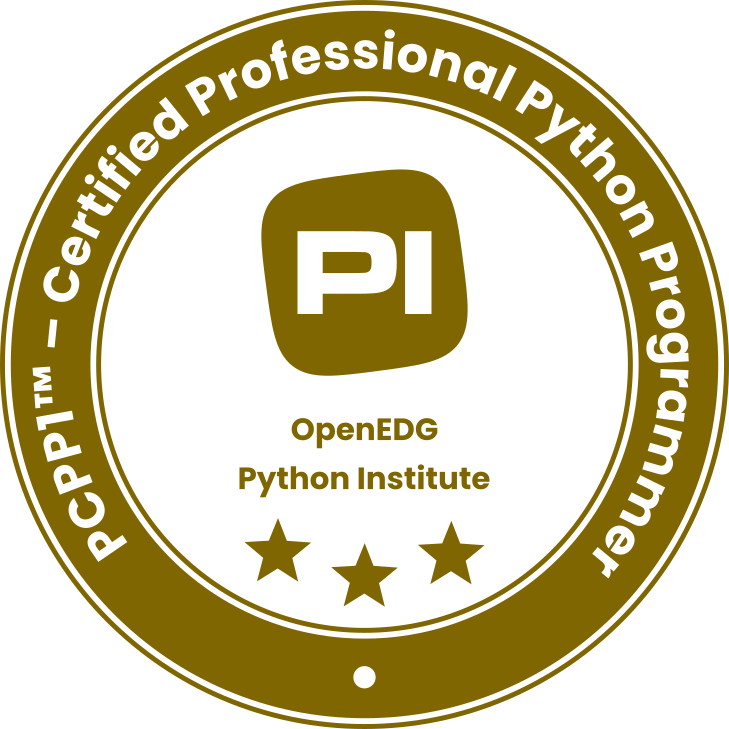PCPP1™ – Certified Professional Python Programmer Level 1
(Exam PCPP-32-10x)PCPP1™ – Certified Professional Python Programmer Level 1 certification is the first of the two-series General-Purpose Programming track professional credentials from the OpenEDG Python Institute addressed to developers, IT specialists, and working professionals looking to obtain an industry credential that documents their skills and expertise in the advanced and more specialized aspects of computer programming and the Python language.
The PCPP1™ certification shows that the individual demonstrates proficiency in the advanced use of classes and OOP features present at the hear of Python programming; knows, understands, and implements the coding conventions, design practices, and standards for code writing; knows how to build a GUI application using the most essential tools and toolkits, conventions, and elements of event-driven programming; understands the basic concepts of network programming and what data formats are used in client-server communication, knows how to use sockets and HTTP methods, and is able to create a simple REST client; knows how to use some of the most important Python Standard Library modules for file processing and interacting with a program's environment.
The PCPP1™ certification shows that the individual is familiar with the following concepts: advanced use of classes and modelling real-life problems in the OOP categories (classes, instances, attributes, methods; class and instance data; shallow and deep operations; inheritance and polymorphism; extended function argument syntax and decorators; static and class methods; attribute encapsulation; composition and inheritance; advanced exceptions; copying object data; serialization; metaclasses), best practices and standardization (PEP8, PEP 257, code layout, comments and docstrings, naming conventions, string quotes and whitespaces, programming recommendations), GUI programming (events, widgets, geometry, tools and toolkits, conventions), the elements of network programming (network sockets, client-server communication, JSON and XML files in network communication, HTTP methods, CRUD, building a simple REST client), and file processing and communicating with a program's environment (processing files: sqlite3, xml, csv, logging, and configparser; communication: os, datetime, io, and time).

Becoming PCPP1™ certified ensures that the individual is fully acquainted with all the essential, intermediate, and advanced means provided by Python 3 and related technologies to enable them to advance their career as a professional Python developer and continue studies at the advanced level.
PCPP1™ certification is a professional high-stakes credential, an interim step to the PCPP2™ certification, and the means to demonstrate high-level Python expertise across multiple fields of programming in Python and using related technologies. Becoming PCPP1™ certified shows that the certification holder possesses a high degree of technical knowledge, work independence, and the skills that allow them to pursue programming careers at junior and middle level.

Become PCPP1™ certified and take your career to the next level
Python is the programming language that opens more doors than any other, and the more you understand Python, the more you can do in the 21st Century. With a solid knowledge of Python, you can work in a multitude of jobs and a multitude of industries.
PCPP1™ certification will be particularly valuable for:
- learners looking to boost their skills and knowledge for a junior-level and middle-level role as a software developer, network programmer, data analyst, or tester;
- industry professionals wishing to explore technologies that are connected with Python, or that utilize it as a foundation;
- team leaders, product managers, and project managers who want gain an in-depth understanding of the terminology and processes in the software development cycle to more effectively manage and communicate with production, QA, and development teams.
Python is either the highest-paid, or one of the highest-paid languages in all parts of the world today, and the salaries range between $90,000 and $130,000 a year (source: SalaryExpert.com).
With the ever-increasing reliance on the Internet, and with Python playing an ever-growing role, the salary of the average Python programmer is almost surely to rise.
Currently, there are 100,000+ unfulfilled Python jobs around the world, and the supply of qualified Python programmers is unable to match the demand.

Sotiris Pafitis
CEO at SCP – School of Certified Professionals, CyprusWe are using Python Essentials (PCEP and PCAP) and Python Advanced (PCPP) study materials to train our students. Our students have progressed from zero experience to entering the marketplace as junior programmers after passing the exams from the Python Institute. The support we received from the OpenEDG team was more than excellent. Great professionals.
PCPP1™: Exam Information
| SPECIFICATIONS ITEM | DESCRIPTION |
|---|---|
| Exam name | PCPP1™ – Certified Professional Python Programmer Level 1 |
| Exam Code & Current Exam Versions | PCPP-32-101 (Status: Active) |
| Pre-requisites | PCAP – Certified Associate in Python Programming (Exam PCAP-31-0x) |
| Validity | Lifetime |
| Exam Duration | Exam: 65 minutes, NDA/Tutorial: 10 minutes |
| Number of Questions | 45 |
| Format | Single- and multiple-select questions | Python 3.x |
| Passing Score | 70% |
| Languages | English |
| Cost | USD 295 (Exam) |
| Delivery Channel | Pearson VUE: Authorized Pearson VUE Testing Centers + OnVUE Online Proctoring from Pearson VUE
OpenEDG Testing Service: 2022 pilot, limited availability |
| Testing Policies | PCPP-32-10x Testing Policies – Click here to view Testing Policies |
| Exam Syllabus | PCPP-32-10x Exam Syllabus – Click here to view Exam Syllabus |
| Associated Certifications | PCEP – Certified Entry-Level Python Programmer (Exam PCEP-30-0x)
PCAP – Certified Associate Python Programmer (Exam PCAP-31-0x) PCPP2™ – Certified Professional Python Programmer Level 2 (Exam PCPP-32-20x) |
| Courses Aligned |
|
PCPP1 FAQ and Quick References
- Read the PCPP1 and Pearson VUE Testing Policies to make sure you follow the code of conduct, meet all the technical requirements, and know what to expect during your exam session.
- Go to pearsonvue.com/pythoninstitute, and create a Pearson VUE web account for OpenEDG exams if you haven't done it yet. (Download a PDF Tutorial)
- Go to OpenEDG Voucher Store and buy an exam voucher.
- Log in to your Pearson VUE web account and book your exam. (Download a PDF Tutorial)
What next? Keep on learning, keep on mastering your Python skills, and keep on climbing the certification ladder. Stay tuned for information about the release of the PCPP2 certification!